Having lived in Taiwan since 2015, I’ve been somehow under the impression that Taipei is rather lacking in quality Mexican food. And that’s the cuisine that many American expats tell me they miss the most since burgers and pizza are readily available across the city. In addition to traditional Mexican fare, I’ve also had a serious hankering for the American-style Chipotle Mexican Grill’s “burrito bols” and salads — a staple food of my grad school days.
But apparently I just listened to the naysayers and didn’t look hard enough. Recently I discovered not just one, but two top-notch joints that satisfy my cravings for both Mexican food and its Americanized variety. Both have been around since 2016, which makes me want to kick myself for not trying earlier.
RICH AND ZESTY TRADITIONS
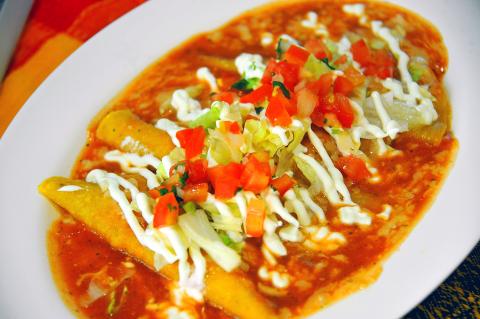
Photo: Han Cheung, Taipei Times
Teotihuacan is hidden in an alley behind the Taipei Municipal Library’s main branch, across the street from Daan Forest Park (大安森林公園). Named after the famous ancient city and pyramids near Mexico City, the restaurant serves traditional Mexican fare — without the spiciness, but the staff tells us they can turn up the heat per request. And it has vegan and vegetarian options too.
Classic and popular Mexican tunes are blaring from a speaker when we arrive, so choose your tables wisely depending on whether you want to talk to your companions. The small space has just a few tables, with the walls adorned with Mexican flags and knick-knacks.
The last time I was here I insisted on ordering the salad (NT$175) in a bid to stay healthy despite the waitress strongly recommending the nachos emperador (NT$275), so this time I give in without prompting. The nachos are loaded, coming with ground pork, pico de gallo (tomato salsa with onion and cilantro), beans, jalapeno and nacho cheese. The jalapenos are tangy but not very spicy, but they still provide a nice kick. The salsa is juicy and refreshing and the meat firm and flavorful, and all the different flavors and textures blend well. The chips were a bit salty, which was fine, but they could have been milder to let the toppings shine more. It was worth the order, although since the rest of the dishes are all pretty heavy, I’m probably sticking to the greens next time I visit.
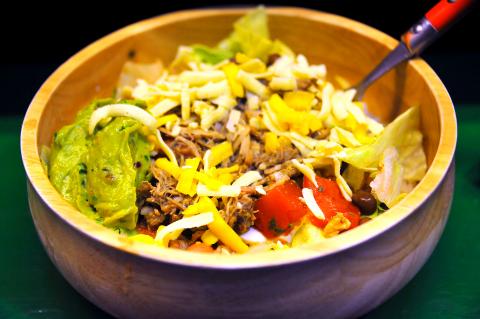
Photo: Han Cheung, Taipei Times
All the following dishes have a mild kick to them provided by the restaurant’s homemade chili sauce, which is revealed to be reduced by half in spiciness to fit the Taiwanese palette. The chicken enchiladas (NT$400) were served on top of a tomato-based sauce with cheese, topped with sour cream, salsa and lettuce. This was the richest dish of the meal, with the zesty sauce, cream and cheese melting into each other, setting a flavorful backdrop for the enchiladas, which came with corn tortillas just crunchy enough with chicken that was pretty tender for breast meat.
Each serving of tamales (NT$150), which are basically a Mexican zongzi (粽子, glutinous rice wrapped dumplings in bamboo leaves), are just enough for one person, so order more if you have a large group. Instead of rice, a mashed corn dough, or masa, is used. It’s pleasantly not too mushy, and one can still make out the grainy texture while the aroma of the leaves come through. There’s a light layer of chili sauce on the tamale, and one can experiment with the accompanying beans, pico de gallo and sour cream to make each bite different.
The chorizo quesadilla (NT$250) is cut into six pieces — perhaps check with them depending on the number of your party so it can be divided equally. Compared to the previous dishes, this one is simple, consisting of two flour tortillas grilled to a perfect crisp with melted cheese and ground sausage in between. The milder cheese pairs well with the sharp taste of the chorizo, although the meat could have been spicier. With such strong flavors, the chili sauce is largely optional, which is probably why the chef set it on the side instead of applying it directly to the food like the previous two dishes. It adds a nice kick to the quesadillas, but runs the risk of making the food taste too similar to what we’ve already consumed.
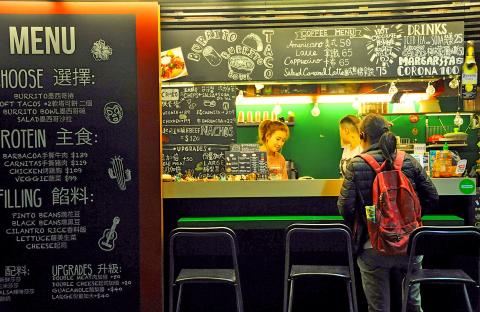
Photo: Han Cheung, Taipei Times
We did not try the desserts such as churros with chocolate sauce or flan (both NT$100), as it would probably give us heart attacks. For drinks they have margaritas (NT$250), tequila shots (NT$100), Corona (NT$150) and your standard variety of non-alcoholic drinks — but I was surprised that they don’t carry horchata, a sweet milk-like drink made from rice or nuts and vegetables that also has an alcoholic version.
NORTH OF THE BORDER
It’s easy to look at Nala’s Mexican Food as a Chipotle clone — their offerings of the same ingredients in burrito, taco, burrito bowl and salad exactly match that of the famous American chain. The choice of meat is identical too: barbacoa (beef), carnitas (pork), grilled chicken and vegetarian/vegan options.
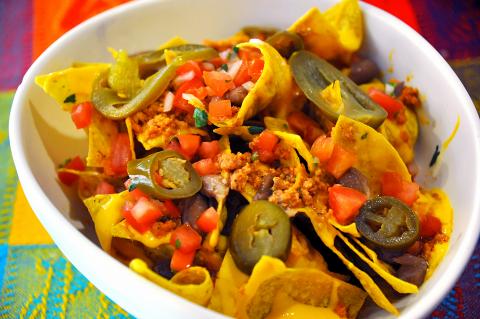
Photo: Han Cheung, Taipei Times
But the difference is that the food at Nala’s is a small-scale, home-cooking style operation compared to Chipotle’s mass production enterprise, and while also similar in taste, the ingredients do feel much fresher. If Teotihuacan was cramped, Nala’s is literally a outdoor bar-style hole in the wall with just four to five chairs, although Chiang Kai-shek Memorial Hall is nearby for a takeout picnic. Nala’s readily identifies as Tex-Mex cuisine, which is basically the variety of Mexican food that arose in Texas and spread across the US, and you probably won’t find food like this in Mexico.
I order the exact same thing I did during my Chipotle days: burrito bowl with carnitas (NT$119) which is pulled pork braised or simmered in oil. I keep forgetting to ask them to put the salsa on the side — while refreshing, I don’t like it getting the rest of the food too soggy. The spiciness of the salsa is also quite mild, but the rest of the ingredients are quite strong in taste.
The pork is tender and flavorful, marinated with spices that the staff wouldn’t reveal to me, claiming it to be the owner’s secret recipe. The biggest surprise is the guacamole (optional for NT$40), which is of the creamier variety, carrying a sharp onion and tomato taste that stops just short of overpowering the avocado. I eschewed the guacamole as a student to save money, but I’ll be adding it every time I come to Nala’s.
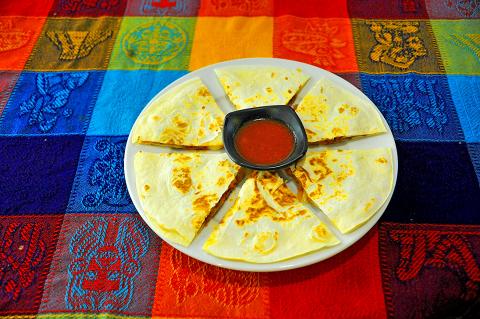
Photo: Han Cheung, Taipei Times
I’ve already visited these two eateries several times since I first discovered them, and I definitely will try more things on the menu such as Teotihuacan’s huevos rancheros, a breakfast dish with eggs, and I’m also curious about Nala’s tomato soups. And, I’ll know what to say next time someone tells me there isn’t decent Mexican or Tex-Mex food in Taiwan.

Exceptions to the rule are sometimes revealing. For a brief few years, there was an emerging ideological split between the Democratic Progressive Party (DPP) and Chinese Nationalist Party (KMT) that appeared to be pushing the DPP in a direction that would be considered more liberal, and the KMT more conservative. In the previous column, “The KMT-DPP’s bureaucrat-led developmental state” (Dec. 11, page 12), we examined how Taiwan’s democratic system developed, and how both the two main parties largely accepted a similar consensus on how Taiwan should be run domestically and did not split along the left-right lines more familiar in

As I finally slid into the warm embrace of the hot, clifftop pool, it was a serene moment of reflection. The sound of the river reflected off the cave walls, the white of our camping lights reflected off the dark, shimmering surface of the water, and I reflected on how fortunate I was to be here. After all, the beautiful walk through narrow canyons that had brought us here had been inaccessible for five years — and will be again soon. The day had started at the Huisun Forest Area (惠蓀林場), at the end of Nantou County Route 80, north and east

This month the government ordered a one-year block of Xiaohongshu (小紅書) or Rednote, a Chinese social media platform with more than 3 million users in Taiwan. The government pointed to widespread fraud activity on the platform, along with cybersecurity failures. Officials said that they had reached out to the company and asked it to change. However, they received no response. The pro-China parties, the Chinese Nationalist Party (KMT) and Taiwan People’s Party (TPP), immediately swung into action, denouncing the ban as an attack on free speech. This “free speech” claim was then echoed by the People’s Republic of China (PRC),

Specialty sandwiches loaded with the contents of an entire charcuterie board, overflowing with sauces, creams and all manner of creative add-ons, is perhaps one of the biggest global food trends of this year. From London to New York, lines form down the block for mortadella, burrata, pistachio and more stuffed between slices of fresh sourdough, rye or focaccia. To try the trend in Taipei, Munchies Mafia is for sure the spot — could this be the best sandwich in town? Carlos from Spain and Sergio from Mexico opened this spot just seven months ago. The two met working in the